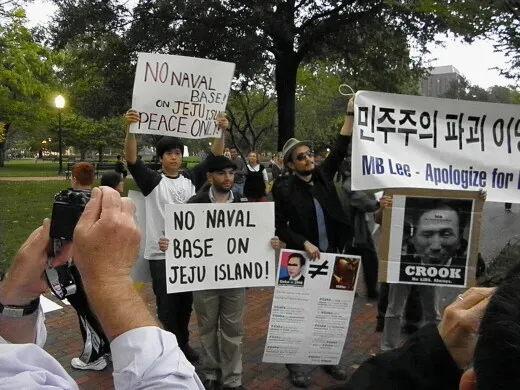hankyoreh
Links to other country sites 다른 나라 사이트 링크
Legal protest dispersed during S.Korea-U.S. summit

By Kellyanne Mahoney, Freelance Journalist
A protest led by Korean-American peace activists in front of the White House was shut down and relocated by U.S. Secret Service police on Thursday during a state dinner hosted by U.S. President Barack Obama in President Lee Myung-Bak’s honor.
Tourists at the scene expressed frustration in witnessing First Amendment rights being suppressed just steps away from such a symbolic site. Organizers of the rally, who held a permit for the event, were surprised to be dispersed less than halfway into their planned four-hour standout against Lee’s policies, which they believe have led South Korea toward a dangerous arms buildup and increased civil liberties violations. Many of the nearly 30 protesters held signs targeted particularly against the construction of a naval base on Jeju Island and in opposition to the South Korea-U.S. Free Trade Agreement (KORUS FTA), recently ratified by the U.S. Congress and soon to be proposed for ratification in South Korea’s National Assembly.
“We have gathered in front of the White House to voice our anger at the South Korean President Lee Myung-bak, whose government has reversed the decades of hard-earned democratic gains by restricting the freedoms of press, assembly and expression,” said H.K. Suh of the group Korean Americans for Peace. “We are asking President Obama and President Lee to pursue a more sincere and proactive approach towards ensuring peace.”
Secret Service police on the scene alleged that the peace activists, who had been granted permission to assemble on the sidewalk directly across from the White House’s front entrance, posed a security threat and reacted by temporarily closing down all of Lafayette Park. The gathering also drew a number of Lee supporters, many retired from the South Korean military, who were there to welcome him. While in town for the state dinner, Lee also addressed the U.S. Congress, thanking the lawmakers for passing the South Korea trade pact. On Friday he traveled with Obama to a General Motors plant in Detroit, Michigan, to celebrate the trade agreement.
Lee’s support for the construction of a naval base on Jeju Island, which has been criticized for its uncertain legal status, has been under increased international heat in recent months, attracting attention in major media outlets in France, Russia, the United States and Japan this week alone.
Since 2007, protests have occurred at the site of the proposed base in Gangjeong, which would host up to 20 American and South Korean warships, including submarines, aircraft carriers and destroyers, several of which would be fitted with the Aegis ballistic-missile defense system. More than 28,000 U.S. troops already remain based in South Korea.
Construction of the base began in January but protests stalled the work in June. Driven by military pressure, construction has again resumed despite democratic appeals for its halt, including one from the Jeju Provincial Council on Oct. 4 following a 22-day investigation into the procedures that set the plan into motion. Gangjeong’s mayor remains in prison for his involvement in the protests. Two hundred others, who have not been accused of any crimes, have been called in for questioning by police due to their affiliations with the naval base resistance.
According to John Feffer, co-director of Foreign Policy In Focus at the Institute for Policy Studies, the fates of the U.S. and South Korea are more interconnected than most realize.
“The United States and South Korea are celebrating the passage of the [free trade agreement] and a very close military alliance,” said Feffer, who attended Thursday’s protest. “But the relationship between the two leaders conceals a number of unfortunate failings: a trade agreement that will throw a lot of workers out of jobs, a shared North Korea policy that has done nothing to improve peace and security on the peninsula, and a project to build a naval base at Jeju that will further jeopardize regional stability. What many observers have called a win-win set of U.S.-South Korea deals has actually been lose-lose for a lot of people in the region. And that’s what people were protesting in D.C. during Lee’s visit.”
Please direct questions or comments to [englishhani@hani.co.kr]
Editorial・opinion
![[Column] Imperial tyranny, Korean humiliation [Column] Imperial tyranny, Korean humiliation](https://flexible.img.hani.co.kr/flexible/normal/500/300/imgdb/original/2025/0912/7617576652278449.jpg) [Column] Imperial tyranny, Korean humiliation
[Column] Imperial tyranny, Korean humiliation![[Correspondent’s column] Cognitive dissonance in MAGA world [Correspondent’s column] Cognitive dissonance in MAGA world](https://flexible.img.hani.co.kr/flexible/normal/500/300/imgdb/original/2025/0912/3417576648512186.jpg) [Correspondent’s column] Cognitive dissonance in MAGA world
[Correspondent’s column] Cognitive dissonance in MAGA world- [Editorial] Korea, US need a ‘gentlemen’s agreement’ on what job creation entails
- [Column] Why MAGA has its eyes set on Korea
- [Column] Lee still has his work cut out for him after summit with Trump
- [Editorial] Is this any way for the US to treat an ally?
- [Column] Lee’s difficult task of striking a balance on Japan
- [Editorial] Multipolar era means Seoul must broaden its diplomacy
- [Column] North and South Korea are no longer pawns in US-China-Russia relations
- [Column] Who we fail when we oversimplify the ‘comfort women’ issue
Most viewed articles
- 1Seoul says US must fix its visa system if it wants Korea’s investments
- 2North Korea said to have exposed numerous US spies after botched 2019 SEAL mission
- 3Freed workers arrive in Korea, one week after ICE raid in Georgia
- 4[Column] Imperial tyranny, Korean humiliation
- 5[Column] Why MAGA has its eyes set on Korea
- 6MAGA’s traveling circus comes to Korea
- 7Korea’s president says firms will be ‘very hesitant’ about investing in US after ICE raid
- 8[Correspondent’s column] Cognitive dissonance in MAGA world
- 9Lee says he won’t sign any tariff deal with US that doesn’t benefit Korea
- 10Son of ex-President Roh Tae-woo tapped to serve as ambassador to China